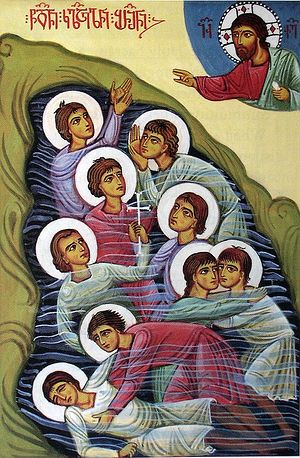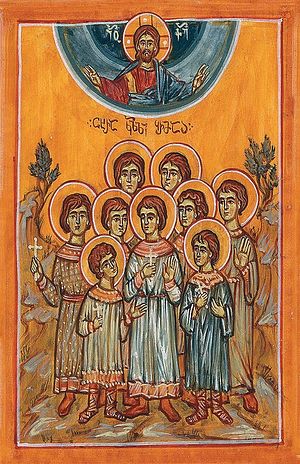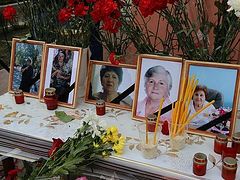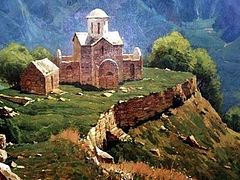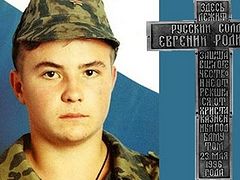Many centuries ago, the village of Kola was located at the source of the Mtkvari River. There Christians and pagans dwelt together as neighbors. Christian and pagan children would play together, but when the Christian children heard church bells ringing, they recognized the call to prayer and dropped their games. Nine pagan children—Guram, Adarnerse, Baqar, Vache, Bardzim, Dachi, Juansher, Ramaz, and Parsman—would follow the Christian children to church.
But the Christians always stopped them near the gates of the church and reprimanded them, saying, “You are children of pagans. You cannot enter God’s holy house.” They would return sorry and dejected.
One day the nine pagan children tried to enter the church forcibly, but they were cast out and scolded. “If you want to enter the church, you must believe in our Lord Jesus Christ and be baptized in the name of the Father and of the Son and of the Holy Spirit,” they were told. “You must receive Holy Communion and join the community of Christian believers.”
With great joy the youths promised the Christians that they would receive Holy Baptism. When the Christians of Kola related to their priest the good news of the pagan boys’ desire, he recalled the words of the Gospel: He that loves father or mother more than Me is not worthy of Me: and he that loves son or daughter more than Me is not worthy of Me. And he that takes not his cross, and follows after Me, is not worthy of Me. (Matt. 10:37-38).
He was not afraid of the anger that would follow from the pagan community, but rather took the boys on a cold winter night and baptized them in the icy river. A miracle occurred while the Holy Sacrament was being celebrated: the water became warm and angelic hosts appeared to the youths. Greatly encouraged in their faith, the children decided to remain in the Christian community rather than return to their parents.
When their parents learned that they had been baptized in the Christian Faith, they dragged their children away from the church, abusing and beating them into submission all the way home. The heroic children endured the abuses and, though they went hungry and thirsty for seven days, repeated again and again, “We are Christians and will not eat or drink anything that was prepared for idols!”
Neither gentle flattery, nor costly clothing, nor promises of good things to come could tempt the God-fearing youths. Rather they asserted, “We are Christians and want nothing from you but to leave us alone and allow us to join the Christian community!”
The enraged parents went and reported to the prince everything that had happened. But the prince was of no help—he simply told them, “They are your children, do with them as you wish.” The obstinate pagans asked the prince permission to stone the children. So a large pit was dug where the youths had been baptized, and the children were thrown inside.
“We are Christians, and we will die for Him into Whom we have been baptized!” proclaimed the holy martyrs, the Nine Children of Kola, before offering up their souls to God.
Their godless parents took up stones, and then others joined in, until the entire pit had been filled. They beat the priest to death, robbed him, and divided the spoils among themselves.
The martyric contest of the Nine Righteous Children of Kola occurred in the 6th century, in the historical region of Tao in southern Georgia.

